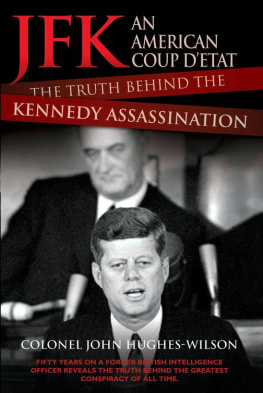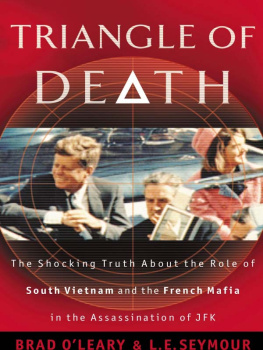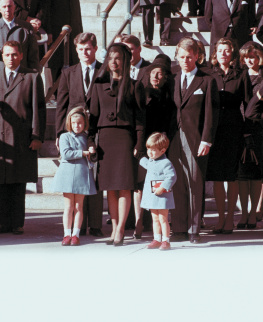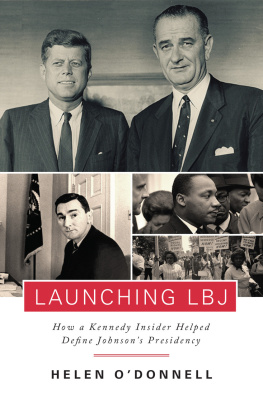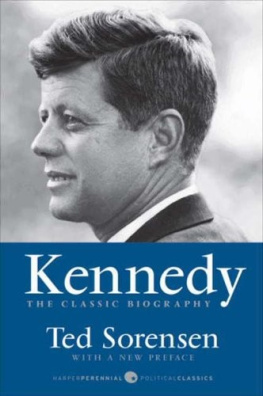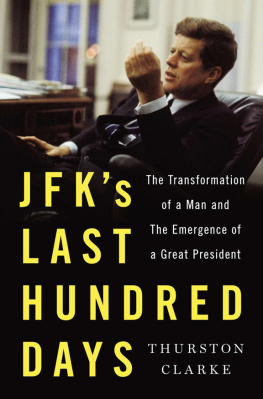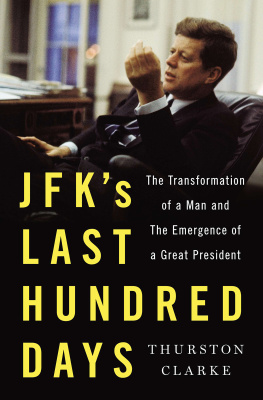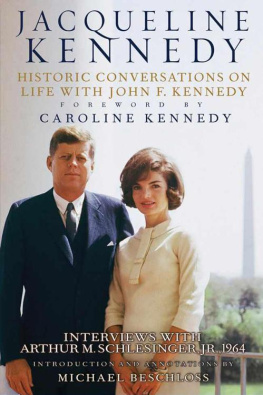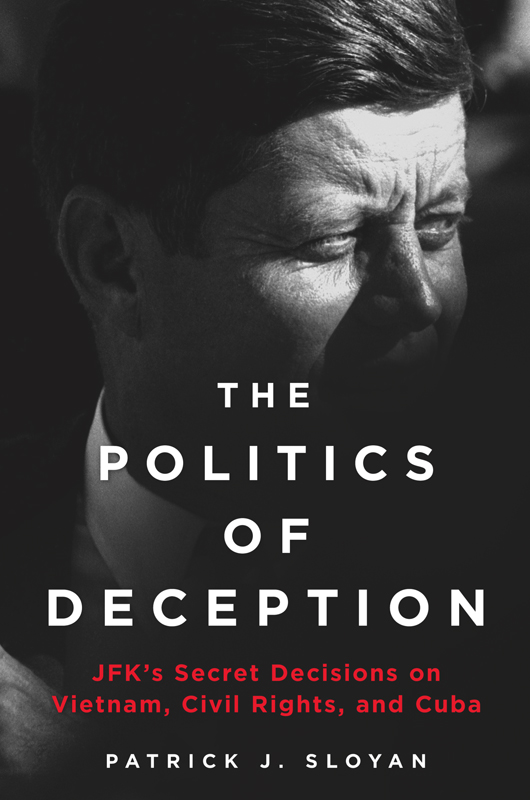Contents
Guide

The author and publisher have provided this e-book to you for your personal use only. You may not make this e-book publicly available in any way. Copyright infringement is against the law. If you believe the copy of this e-book you are reading infringes on the authors copyright, please notify the publisher at: us.macmillanusa.com/piracy.
For Phyllis, the blue-eyed girl with the friendly smile
JFK
J OHN FITZGERALD KENNEDY WAS ELATED. He walked toward me, grinning. He wore a brown pinstripe too big for his shoulders, a rep tie, and a white handkerchief in his lapel pocket. He fingered the center coat button. His face had a springtime tan, and the sun had created reddish highlights in his thick, light brown hair. I was one of a handful of reporters who had just listened to his inspirational use of history and wit to awaken University of Maryland students to a life of public service. Senator Kennedy, replete with cheers and applause, was ready for our questions.
I was spellbound by his speaking style and sparkling humor. To illustrate the joy of politics, Kennedy had recounted the journey of Thomas Jefferson and James Madison prior to the 1800 presidential election. The two founding fathers claimed not politics but the study of flowers and ferns, birds and bees, were the reason for their trip through Hudson River Valley and most of New England. Village by village, town by town, Jefferson and Madison proved the success of personal contact with voters by winning the White House. Kennedy responded to the student roar with a toothy smile. He was the most sought after speaker of the day, with looks and style that stirred both men and women. It was April 27, 1959, and Kennedy was on the verge of his bid for the presidency of the United States.
I do not come here today in search of butterflies, Kennedy said. More cheering.
I understood his ambitions only vaguely that day. While a professional journalist since leaving the U.S. Army in 1957, I was enrolled at Maryland on the GI Bill. But I worked part-time for the Washington Evening Star and the Baltimore News-Post and would file stories to both newspapers on Kennedys speech. I knew enough to ask a serious question of a politician. And, because of his command of history in the days speech, I recalled the 1928 campaign of Al Smith, the Democratic presidential candidate defeated by Republican Herbert Hoover. Many say Smiths Catholicism played a role in his defeat, I noted. Do you think it will hurt your candidacy? He had heard the question before, but I wanted my own answer. I was unprepared for his reaction. The humor washed from his face. His eyes and mouth hardened. His elation from the crowds applause vanished. He looked at me and then said firmly, No, my religion will be an asset. America is a religious nation and Americans will respect my religion. His gaze shifted to the next questioner, who was interested in pending Senate legislation. Then he shot me another dirty look before handling the new question. Who the hell is this kid? the glare seemed to say.
At that moment, I was unaware Catholicism was his political millstone. Three years earlier at the Democratic Convention in Chicago, Adlai Stevenson, the nominee, rejected Kennedys bid for the vice-presidential nomination. America is not ready for a Catholic yet, Stevenson told Jim Farley, himself a Catholic and political adviser to President Franklin D. Roosevelt. While backing Kennedys bid in Chicago, Tennessee senator Albert Gore told Stevenson that Catholicism was an insurmountable problem for the Democratic ticket. Also objecting was House Speaker Sam Rayburn. Well, if we have to have a Catholic, I hope we dont have to take that little pissant Kennedy. Most of those very same political players would leap to their feet and cheer four years later when Kennedy seized the presidential nomination in the 1960 Democratic Convention in Los Angeles.
Kennedys outward energy, sunny good looks, and quick tongue made him an easy choice over the dark and dour Richard M. Nixon. Kennedy won handily with the electoral vote that decides presidential elections303 to Nixons 219. But the popular vote, which provides a deeper measure of American sentiment, left him with a fingernail of 118, 574 votes out of 68 million cast, the smallest plurality since the 1884 election seventy-six years earlier. Of course, Virginia senator Harry F. Byrd won 500,000 votes that year as a third party candidate. But at dawn that day of victory, Kennedy was in the minority, with only 49.7 percent of the popular vote. Former president Harry Truman was mystified. Why, even our friend, Adlai, would have had a landslide running against Nixon, Truman told a friend. While Kennedys election was a breakthrough for religious tolerance, a close look at the vote showed him the first president to be elected with a minority of Protestant voters. Voter perception of his Catholicism had undercut Kennedy once again.
The closeness of that election was never far from his thoughts while he was president and planning for his second term. Every move, every speech, every White House visitor, every presidential trip, every decision was connected to his 1964 presidential reelection campaign. For modern American presidents, the struggle to prevail for a second term begins when the left hand is on the Bible and the other in the air for the inauguration of their first term. As he prepared for reelection in 1963, events in Cuba, the civil rights movement, and Vietnam were eroding his chances for a second term. How he responded to these challenges was hidden from the world by a docile, at times worshipful Washington media. The president could count on an array of powerful journalists as personal friends in those years. There were exceptions. Frontline reporters such as Lloyd Norman, Newsweek s Pentagon reporter, so upset Kennedy that he ordered that the Central Intelligence Agency trail Norman and embarrass leakers. David Halberstam, the New York Times reporter in Saigon, caused Kennedy almost daily fits. He pressured the newspapers publisher to yank Halberstam. Almost any criticism pierced the presidents thin skin. It is almost impossible to write a story they like, said Ben Bradlee of Newsweek and a personal friend of the president. Even if a story is quite favorable to their side, theyll find one piece to quibble with. But Kennedy had no reason to complain about me. I was in the press section only a few feet from Kennedy on that snowy January 20 inauguration. Once again, Kennedys address and the electricity of the day enthralled me. For the next two years and eleven months, I would have a front row seat as Kennedy delivered one dynamite speech after another. There were some clunkers. But for the grand moments there were grand performances. My Irish-American Catholic background did a mind meld with Jack Kennedy.
I had joined the Washington bureau of United Press International in September of 1960 and soon gained unimaginable power and influence. Journalism was the intersection between politicians and their voters. The UPI A Wire stories sent by teletype over telephone wires at sixty words per minute were delivered to the editor of newspapers around the globe. The first time I heard CBS anchorman Walter Cronkite, a UPI veteran, read the exact words I had writtenwell, it was a trip. Clippings from newspapers including the New York Times and the Washington Post swelled my ego. My perceptions of a news event were in direct competition with those from the Associated Press. My dispatch was delivered well ahead of other Washington bureau reporters. Often their editors would demand facts matching or better than Sloyans UPI account. At UPI, we doted on Kennedy, who seemed to dominate our daily report. My colleague, Helen Thomas, elevated his wife and children to a news category reserved for Britains royal family.


